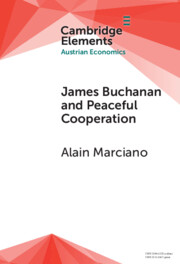Element contents
James Buchanan and Peaceful Cooperation
Published online by Cambridge University Press: 31 May 2024
Summary
- Type
- Element
- Information
- Series: Elements in Austrian EconomicsOnline ISBN: 9781009493826Publisher: Cambridge University PressPrint publication: 27 June 2024
References
- 4
- Cited by

